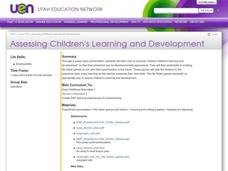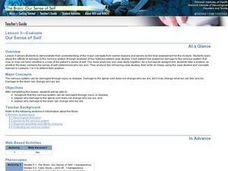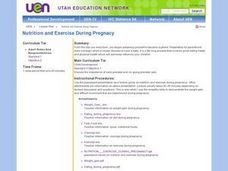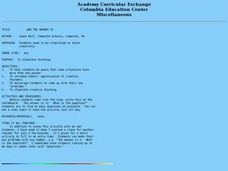Curated OER
Conceptual Change: The History of Thanksgiving
Twelfth graders investigate how to analyze, question and debate the validity of the information given to them from teachers, text books, the media and their peers. The purpose of this lesson is to foster a true understanding about the...
Curated OER
Introducing Psychology
Students investigate the concept of observable behavior. They watch someone for three to five minutes and record everything that is seen. Students must be as objective as possible, avoid any value judgments about physical appearance or...
Curated OER
Assessing Children's Learning and Development
Students analyze ways to assess children's learning and development using a variety of strategies. They will prepare for this through making their own file folder game to assess children's development in the future, as directed by the...
Curated OER
THE FLOW OF MUSIC AND POETRY
Students explore their feelings about rain through art, music, and poetry. They listen to music as they think about rain and determine how they feel about rain. Students create either poetry or artwork about as they listen to music...
Curated OER
Memory Game
Students interact with different explorers and their motivations for exploration. They make a deck of memory cards. Students use 20 specific motivational factors in making their cards. They then play their game.
Curated OER
Valentine's Day
Student's research the history to Valentine's Day. They take an online quiz and then think about all the different meanings of love. Sharing of ideas is involved within this lesson. They ponder on how emotions can be expressed in...
Curated OER
School Uniforms
Students view various aspects of peer pressure and their complications. Students define the issues of uniform rules and design a uniform for their teachers. Students develop ideas for dress codes.
Curated OER
Famous People With Dyslexia
Students map out a plan of how schools could become more dyslexic friendly. Students create a portfolio on famous people who have overcome dyslexia and developed their talents.
Curated OER
A Friend Is...
Students investigate characteristics of friendship through literature and interviews then share their ideas through posters. They role play scenarios related to friends and problems they might have. This lesson reflects cross curricular...
Curated OER
Volcanoes In Japan
Sixth graders study the characteristics of volcanoes in this unit. They apply the research to the study of three volcanoes in Japan. They complete mapwork, identify indicators of impending volcanic activity, and describe the dangers...
Curated OER
Personality and Posts
Students examine the personality type needed to become a diplomat in the US Foreign Service. They look at the results of the Myers-Briggs Personality Test that each diplomat in training must take. They study their own personality type to...
Curated OER
Nervous System: Our Sense of Self
Students analyze the effects of damage to the nervous system by examining four fictitious patient cases. They discuss one case together and then individually write essays about the remaining cases
Curated OER
So You Think You Got A Problem
Students find alternatives to conflicts that they, may confront in their everyday lives Through the use of literature, students are given opportunities to use parallel tasks that will instruct them on how to identify and correct their...
Curated OER
Respect
Students, in groups, exchange their opinions and experiences on issues around respect and anti-social behavior. They come up with approaches to youth crime prevention and discuss and present their own solutions.
Curated OER
Rorschach Inkblot Test
Students express their creativity in making their own Rorschach Inkblot Test.
Curated OER
Feminization of Work
Students explain trends in the work of women and men. They examine why work has increasingly become feminized internationally and engage in a class discussion about their own situations at home regarding work.
Curated OER
RESILIENCY AND THE LITTLE ROCK 9
Students develop and encourage self support strategies through sharing stories of resiliency. They stand up and read aloud from numbered strips of paper with short sentences the story of The Little Rock 9.
Curated OER
Needs and Wants
Students examine the difference between psychological needs and wants to control spending.
Curated OER
Population Fundamentals-Building a Foundation
Students present demographic data in a graphic format that supports analysis and interpretation.
Curated OER
Positive Guidance Techniques
Young scholars study different guidance techniques for Students. They apply their knowledge by creating a roller-box story to share with the class.
Curated OER
Nutrition and Exercise During Pregnacy
Young scholars study healthy eating habits for life long health and parenthood.
Curated OER
Intellectual Development (Piaget)
Learners study an overview of intellectual development and Piaget's stages of development.
Curated OER
. . .And the Answer is
Students appreciate creative thinking and that some situations have more than one answer.
Curated OER
Classical Conditioning Experiment
Young scholars define classical conditioning and identify its four parts.

























